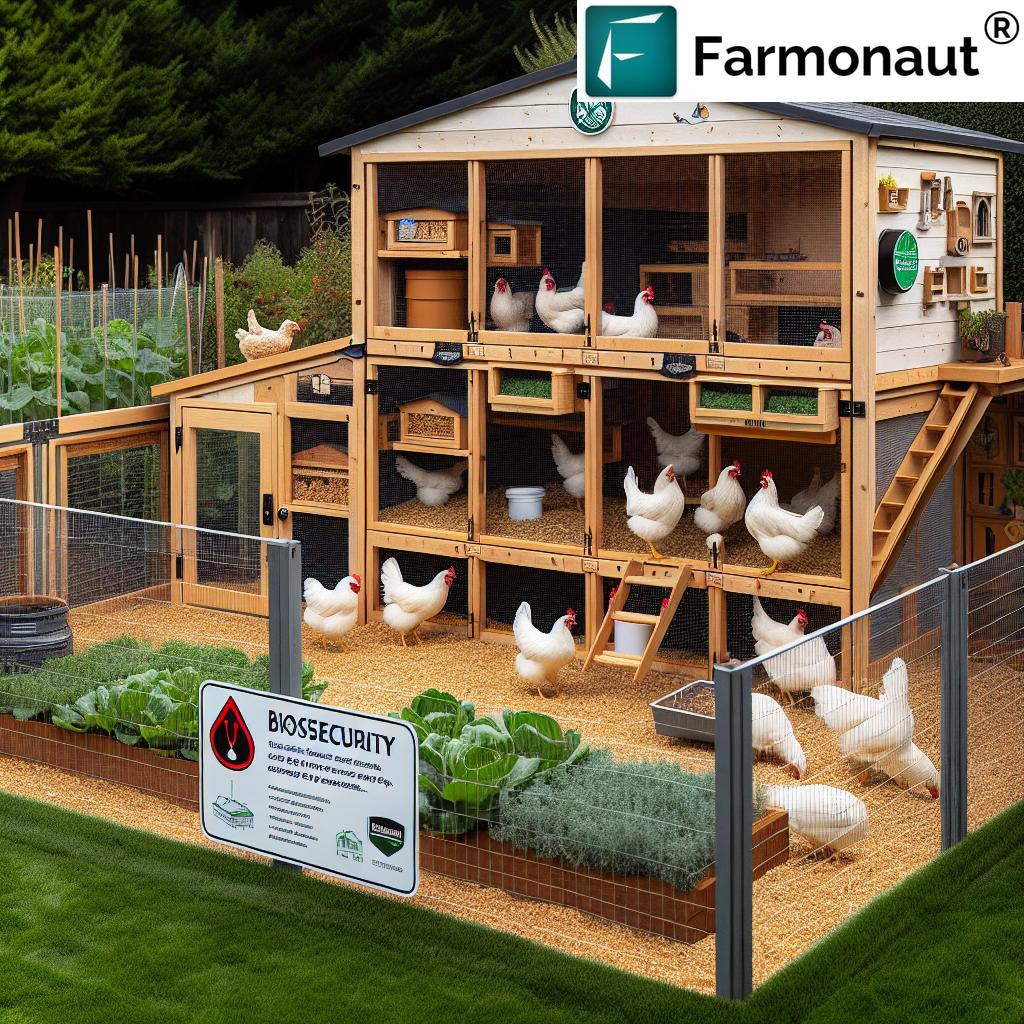Essential Biosecurity Practices for Healthy Backyard Chickens: A Guide for NSW Poultry Owners

“Implementing proper biosecurity measures can reduce disease risks in backyard chicken flocks by up to 90%.”
Welcome to our comprehensive guide on essential biosecurity practices for healthy backyard chickens in New South Wales (NSW). As the popularity of urban chicken keeping continues to grow, it’s crucial for poultry owners to understand and implement proper biosecurity measures. In this blog post, we’ll explore the world of sustainable poultry farming, focusing on chicken health and welfare for small-scale egg production.
At Farmonaut, we’re committed to promoting responsible and sustainable agricultural practices. While our expertise lies in satellite-based farm management solutions, we recognize the importance of biosecurity in all aspects of farming, including backyard chicken keeping. Let’s dive into the essential practices that will help you maintain a healthy, happy flock while minimizing health risks for both birds and humans.
Understanding Backyard Chicken Biosecurity
Biosecurity refers to the measures taken to prevent the introduction and spread of diseases among your chickens. For backyard poultry owners in NSW, implementing strong biosecurity practices is not just a recommendation – it’s a responsibility. These practices protect not only your flock but also the broader poultry industry and public health.
- Disease prevention
- Pest control
- Proper coop management
- Safe feed and water practices
By focusing on these key areas, we can create a safer environment for our backyard chickens and reduce the risk of zoonotic diseases that can transfer from birds to humans.
Essential Biosecurity Measures for Backyard Chickens
1. Proper Coop Planning and Management
The foundation of good biosecurity starts with a well-designed and properly managed chicken coop. Here are some key considerations:
- Location: Place your coop away from wild bird habitats and ensure proper drainage to prevent water accumulation.
- Construction: Use materials that are easy to clean and disinfect. Ensure the coop is predator-proof and provides adequate ventilation.
- Cleanliness: Regularly clean and disinfect the coop, nesting boxes, and equipment. Remove droppings daily and perform a deep clean monthly.
- Bedding: Use fresh, clean bedding and replace it regularly to maintain a hygienic environment.
Pro Tip: Consider using a disinfectant specifically designed for poultry coops to ensure effective sanitization.
2. Chicken Health and Welfare
Maintaining the health and welfare of your chickens is crucial for a thriving backyard flock. Here’s what you need to focus on:
- Regular health checks: Observe your chickens daily for signs of illness, such as lethargy, reduced appetite, or abnormal droppings.
- Vaccination: Consult with a veterinarian to establish an appropriate vaccination schedule for your flock.
- Quarantine: Isolate new birds or sick chickens for at least 30 days before introducing them to the flock.
- Stress reduction: Provide a calm environment with adequate space, proper lighting, and protection from extreme weather conditions.
Remember: Early detection and treatment of diseases can prevent outbreaks and protect your entire flock.
3. Feed and Water Management
Proper nutrition and clean water are essential for maintaining healthy chickens. Follow these guidelines:
- Feed storage: Store feed in sealed containers to prevent contamination by pests or wild birds.
- Water quality: Provide clean, fresh water daily and regularly clean and disinfect waterers.
- Balanced diet: Offer a well-balanced poultry feed appropriate for your chickens’ age and purpose (layers vs. meat birds).
- Treat moderation: Limit treats to no more than 10% of the diet to ensure proper nutrition.
Tip: Consider using nipple waterers to reduce the risk of water contamination from droppings or debris.
4. Pest and Wildlife Control
Protecting your flock from pests and wildlife is crucial for maintaining biosecurity. Implement these measures:
- Rodent control: Use traps or bait stations to manage rodent populations around the coop.
- Wild bird deterrents: Install netting or visual deterrents to keep wild birds away from your chickens’ feed and water.
- Insect management: Regularly inspect for and treat any insect infestations, such as mites or lice.
- Predator-proofing: Secure the coop and run against potential predators like foxes, dogs, or birds of prey.
Important: Always use pest control methods that are safe for your chickens and comply with local regulations.
5. Visitor and Equipment Management
Limiting and controlling access to your chicken area is essential for biosecurity. Follow these practices:
- Visitor restrictions: Limit access to your chicken area, especially for people who have been in contact with other poultry.
- Footwear hygiene: Use dedicated boots or shoe covers when entering the chicken area.
- Hand washing: Provide hand sanitizer or a washing station for use before and after handling chickens.
- Equipment cleaning: Regularly clean and disinfect all equipment used in chicken care.
Best practice: Keep a visitor log to track who has been in contact with your flock in case of a disease outbreak.
Urban Chicken Keeping Regulations in NSW
“Urban chicken keeping regulations in NSW typically limit backyard flocks to 5-10 hens per household.”
Before establishing your backyard flock, it’s crucial to understand and comply with local regulations. In NSW, urban chicken keeping is generally allowed, but there are specific rules to follow:
- Flock size: Most councils limit the number of chickens to 5-10 per household in urban areas.
- Roosters: Many urban areas prohibit keeping roosters due to noise concerns.
- Coop placement: Coops must typically be located a certain distance from property boundaries and dwellings.
- Hygiene standards: Owners must maintain clean conditions to prevent odors and pests.
- Registration: Some councils may require registration of backyard poultry.
Note: Always check with your local council for specific regulations in your area, as they may vary between municipalities.

Sustainable Poultry Farming Practices
At Farmonaut, we believe in promoting sustainable agricultural practices across all farming scales. While our focus is on large-scale precision agriculture using satellite technology, many of the principles can be applied to backyard chicken keeping. Here are some sustainable practices to consider:
- Composting: Use chicken manure and bedding as compost for your garden, creating a closed-loop system.
- Free-ranging: Allow chickens to forage naturally, which can reduce feed costs and improve soil health.
- Water conservation: Implement rainwater collection systems for coop cleaning and watering.
- Natural pest control: Chickens can help control insect populations in your garden naturally.
- Recycling: Repurpose materials for coop construction and chicken enrichment items.
By implementing these practices, you not only create a more environmentally friendly chicken-keeping setup but also potentially reduce costs and improve the overall health of your flock.
Nutrition Guidelines for Healthy Chickens
Proper nutrition is fundamental to maintaining healthy backyard chickens. While Farmonaut’s expertise lies in crop health monitoring for large-scale agriculture, the principles of good nutrition apply across all farming scales. Here’s what you need to know about feeding your backyard flock:
- Balanced feed: Provide a commercial layer feed that meets all nutritional requirements for egg-laying hens.
- Calcium supplements: Offer crushed oyster shells or limestone for strong eggshells.
- Grit: Provide insoluble grit to aid in digestion, especially if your chickens free-range.
- Fresh fruits and vegetables: Offer as treats, but limit to 10% of the diet.
- Clean water: Ensure constant access to fresh, clean water.
Tip: Adjust feed based on the age and production stage of your chickens. Chicks, pullets, and mature laying hens have different nutritional needs.
Disease Prevention Strategies
Preventing diseases is crucial for maintaining a healthy flock and ensuring food safety for egg consumers. Here are key strategies to implement:
- Vaccination: Follow a veterinarian-recommended vaccination schedule for common poultry diseases.
- Parasite control: Regularly deworm chickens and treat for external parasites like mites.
- Stress reduction: Minimize stressors like overcrowding, extreme temperatures, or sudden changes in routine.
- Proper ventilation: Ensure good air circulation in the coop to reduce respiratory issues.
- Hygiene practices: Maintain clean living conditions and practice good personal hygiene when handling chickens.
Remember: Early detection is key. Familiarize yourself with common signs of illness in chickens and act promptly if you notice any changes in behavior or appearance.
Biosecurity Checklist for Backyard Chicken Owners
To help you implement and maintain proper biosecurity measures, we’ve created a comprehensive checklist. Use this table as a quick reference guide for essential practices:
| Practice | Frequency | Importance Level | Notes |
|---|---|---|---|
| Coop cleaning | Daily/Weekly | High | Remove droppings daily, deep clean weekly |
| Feed storage check | Weekly | Medium | Ensure feed is sealed and pest-free |
| Water cleanliness | Daily | High | Provide fresh water, clean containers |
| Flock health check | Daily | High | Observe for signs of illness or injury |
| Pest control inspection | Weekly | Medium | Check for signs of rodents or wild birds |
| Equipment sanitization | Monthly | Medium | Clean and disinfect all chicken-related equipment |
| Visitor log update | As needed | Low | Record all visitors to the chicken area |
| Vaccination review | Annually | High | Consult vet for updated vaccination needs |
By following this checklist regularly, you’ll significantly reduce the risk of disease outbreaks and maintain a healthy, productive flock.
The Role of Technology in Backyard Chicken Keeping
While backyard chicken keeping might seem like a low-tech endeavor, modern technology can play a significant role in improving flock management and biosecurity. At Farmonaut, we specialize in satellite-based farm management solutions for large-scale agriculture. However, many of the principles we apply can be adapted for small-scale poultry keeping:
- Automated coop doors: Improve security and reduce the risk of predator attacks.
- Remote monitoring systems: Keep an eye on your flock when you’re away from home.
- Digital record-keeping: Track egg production, health issues, and biosecurity measures.
- Smart feeders and waterers: Ensure consistent access to food and water while reducing waste.
- Environmental control systems: Maintain optimal temperature and humidity in the coop.
While our Farmonaut app is designed for larger agricultural operations, the principles of data-driven decision-making can be applied to backyard flocks as well. Consider keeping detailed records of your chickens’ health, egg production, and any biosecurity measures implemented to help identify trends and potential issues early on.
Community Engagement and Education
Engaging with your local community and staying educated on best practices is crucial for responsible backyard chicken keeping. Here are some ways to get involved and stay informed:
- Join local poultry clubs: Connect with experienced chicken keepers in your area.
- Attend workshops: Participate in biosecurity and chicken care workshops offered by agricultural extension offices.
- Online forums: Engage with other backyard chicken enthusiasts to share experiences and advice.
- Stay updated: Follow reputable sources for the latest information on poultry health and biosecurity.
- Educate others: Share your knowledge with neighbors and friends interested in starting their own flocks.
By actively participating in the backyard chicken community, you not only improve your own practices but also contribute to the overall health and sustainability of urban poultry keeping.
Emergency Management for Backyard Flocks
Being prepared for emergencies is an essential part of responsible chicken keeping. Here are some key aspects of emergency management to consider:
- Disease outbreak plan: Have a protocol in place for isolating sick birds and contacting a veterinarian.
- Natural disaster preparedness: Develop a plan for protecting your flock during extreme weather events.
- First aid kit: Keep basic supplies on hand for treating minor injuries or illnesses.
- Emergency contact list: Maintain a list of important contacts, including your veterinarian and local animal control.
- Evacuation strategy: Have a plan for safely transporting your chickens in case of evacuation.
Tip: Regularly review and update your emergency plans to ensure they remain effective and relevant.
Conclusion: Embracing Responsible Backyard Chicken Keeping
As we’ve explored throughout this guide, maintaining healthy backyard chickens requires dedication, knowledge, and consistent application of biosecurity practices. By implementing the strategies discussed – from proper coop management and nutrition to disease prevention and emergency preparedness – you can create a safe, healthy environment for your flock while minimizing risks to public health.
Remember, backyard chicken keeping is not just about egg production; it’s about fostering a connection with our food sources, promoting sustainable living, and enjoying the companionship of these fascinating birds. As responsible poultry owners, it’s our duty to prioritize the health and welfare of our chickens while being mindful of our impact on the broader community and environment.
At Farmonaut, while our focus is on large-scale precision agriculture, we recognize the importance of sustainable practices at all levels of farming. Whether you’re managing a small backyard flock or overseeing vast agricultural operations, the principles of responsible management, data-driven decision-making, and continuous learning remain crucial.
We encourage you to stay informed, engage with your local chicken-keeping community, and continuously refine your practices. By doing so, you’ll not only enjoy the rewards of fresh eggs and delightful chicken antics but also contribute to a more sustainable and food-secure future.
Frequently Asked Questions (FAQ)
- How many chickens can I keep in my backyard in NSW?
Most NSW councils allow 5-10 chickens in urban areas, but check your local regulations for specific limits. - Do I need a permit to keep backyard chickens in NSW?
Generally, no permit is required for small flocks, but some councils may have registration requirements. Always check with your local authority. - Can I keep roosters in my backyard in NSW?
Many urban areas prohibit roosters due to noise concerns. Check your local council regulations before considering a rooster. - How often should I clean my chicken coop?
Remove droppings daily and perform a deep clean weekly to maintain good hygiene and biosecurity. - What should I feed my backyard chickens?
Provide a balanced commercial layer feed, supplemented with calcium sources and limited treats (no more than 10% of their diet). - How can I protect my chickens from predators?
Use predator-proof coops and runs, secure latches, and consider motion-activated lights or alarms. - What are the signs of illness in chickens?
Watch for lethargy, reduced appetite, abnormal droppings, respiratory issues, or changes in egg production. - How often should I vaccinate my backyard chickens?
Consult with a veterinarian to establish an appropriate vaccination schedule based on your local disease risks. - Can backyard chickens transmit diseases to humans?
Yes, some diseases (zoonoses) can be transmitted. Practice good hygiene and biosecurity to minimize risks. - How long do backyard chickens typically live?
With proper care, backyard chickens can live 5-10 years, though egg production may decrease after 2-3 years.






